Completed evaluations
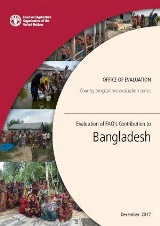
Evaluation of FAO’s Contribution to Bangladesh
29/12/2017
FAO’s programme in Bangladesh is one of the largest among member countries in terms of number and volume of projects. In consultation with the Regional Office for Asia and the Pacific (RAP) and the FAO Country Office in Bangladesh, OED conducted an evaluation of the Bangladesh country programme to provide input into the preparation of the next CPF.
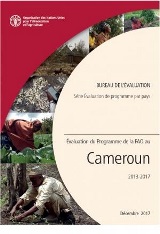
FAO’s Country Programme Evaluation in Cameroon 2013 - 2017
29/12/2017
FAO’s Country Programme Evaluation in Cameroon assessed the strategic positioning of the Organization in the country and its contributions to the priority areas agreed with the Government of Cameroon for the period 2013-2017 (as identified in the Country Programming Framework).The period covered by the evaluation was characterized by an increased...
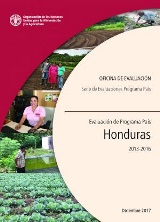
Evaluation of FAO’s Country Programme in Honduras 2013-2016
22/12/2017
FAO’s evaluation in Honduras aimed at assessing the level of achievement of the results planned between 2013 and 2016, taking into account how it has contributed to changing the capacities of national institutions and the conditions of development of the beneficiary groups where the projects were located. In particular, the...
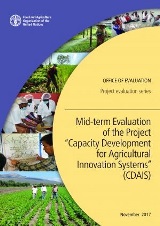
Mid-term Evaluation of the Project “Capacity Development for Agricultural Innovation Systems” (CDAIS)
15/12/2017
The project was conceived to support the implementation of the Tropical Agriculture Platform (TAP) action plan by establishing a global mechanism to promote, coordinate and evaluate capacity development approaches to strengthen Agricultural Innovation Systems (AIS), with needs assessed and approaches validated in eight pilot countries (Angola, Bangladesh, Burkina Faso, Ethiopia, Guatemala, Honduras, Laos and Rwanda).
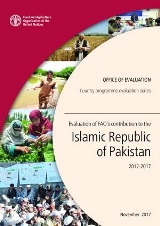
Evaluation of FAO’s contribution to the Islamic Republic of Pakistan
30/11/2017
Pakistan has more livestock than people, and FAO can help to harness this immense resource for greater food security. For the eradication of animal diseases, FAO is well-positioned to assist the federal and provincial governments in reforming related legislation and allocating the required resources. The Organization demonstrated a successful model of cooperation between federal and provincial authorities to control some animal diseases
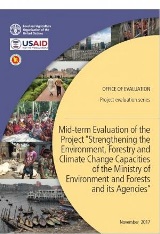
Mid-term Evaluation of the Project “Strengthening the Environment, Forestry and Climate Change Capacities of the Ministry of Environment and Forests and its Agencies”
30/11/2017
As investments for climate resilience grow in Bangladesh, there is a need to foster cross-sectoral planning and coordination, and to ensure coherence amongst the large number of climate-change and environment-related investments in the country. To this end, FAO has supported the government of Bangladesh in developing the first ever country investment plan for the environment, forestry and climate change sectors, with funding from USAID from 2013 to 2018.
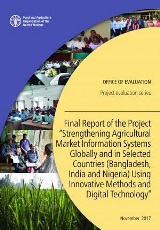
Final Evaluation of the Project “Strengthening Agricultural Market Information Systems Globally and in Selected Countries (Bangladesh, India and Nigeria) Using Innovative Methods and Digital Technology”
22/11/2017
Food price volatility is one of the major concerns for development practitioners and policymakers worldwide. FAO’s project aimed to address this issue by improving data reliability, timeliness and frequency through capacity development activities in national institutions, as well as developing and piloting improved methodologies in three targeted countries: Bangladesh, India and Nigeria.
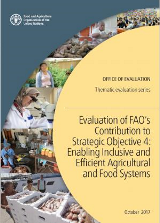
Evaluation of FAO’s contribution to enable inclusive and efficient agricultural and food systems (SO4)
19/10/2017
In today’s interconnected world, with globalized food trade and resource flows across different regions, a ‘systems thinking’ for sustainable consumption and production patterns is needed. FAO’s SO4 programme is about broadening perspectives - from a focus on production to a holistic agricultural and food system approach.
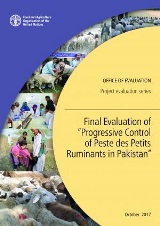
Final Evaluation of “Progressive Control of Peste des Petits Ruminants in Pakistan” GCP/PAK/127/USA
16/10/2017
Peste des Petits Ruminants (PPR) is an animal disease which has become endemic in Pakistan since its first appearance in 1991. It spreads easily among herds and across borders and is often fatal for the sheep and goats it affects. The purpose of this final evaluation is to analyse project achievements, draw lessons for planners and recommend future actions that FAO and the Government of Pakistan should take to accelerate the progressive control of the PPR disease in the country.
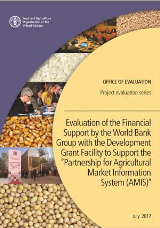
Evaluation of the Financial Support by the World Bank Group with the Development Grant Facility to Support the “Partnership for Agricultural Market Information System (AMIS)”
02/10/2017
The Evaluation of the financial support by the World Bank Group with the Development Grant Facility to support the “Partnership for Agricultural Market Information System (AMIS)” was conducted in 2016-2017.
